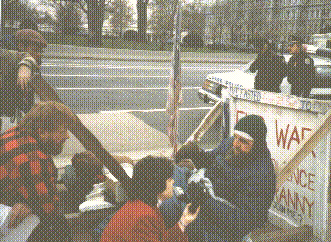
If we are to prevent a worldwide holocaust,
economic and environmental necessity dictate
POLLUTION CONTROL INDUSTRIES:
THE FUTURE WAVE OF REPLACEMENT FOR WEAPONS INDUSTRIES
Today the world suffers from the limited ability of the earth
to absorb the wastes from our high populations and from our
ever-advancing technologies. As the world's population approaches
"zero population growth," the major waste problems involve the
nuclear, chemical and biological technologies. In each of these
categories, toxic substances with concentrations of one part per
billion or less will kill exposed humans. Yet industries producing
and marketing these toxic substances have habitually, and often
illegally, dumped their uncontrolled wastes into the air, water or
soil for convenience. As a consequence, the remotest parts of the
earth and its living inhabitants have become contaminated with
radioactivity, mercury, DDT, PCB's, Dioxin, and a host of other new
toxics.
Whole populations of birds, seals, and other animals at the
tops of their food chains are beginning to disappear from the
regions of greatest concentration of these deadly industrial
wastes. Since human beings are at the tops of all of the food
chains on Earth, it is past time for us to revolutionize our
thinking and toxic waste practices. If we do not start containing
our toxic wastes and keeping them separated from the biosphere for
the duration of their toxicity, we too will begin to disappear from
the regions of greatest concentration of toxic wastes.
Due to its highly advanced technologies, and a "look the other
way" Environmental Protection Agency, the United States is one of
the major contributors to the world's uncontrolled toxic wastes
burden. Other major contributors are industries in Japan, Europe,
the USSR and developing China, India and the Middle East. All of
these developed and developing countries are prime customers for
toxic waste control products.
The magnitude of such industries can be anticipated by
realizing that toxic waste controls are needed on all cars, ships,
aircraft, fireplaces, gas furnaces, stoves, dryers, refrigerators,
washing machines, sewage systems, power plants (nuclear, coal, oil
and gas), mineral refinement plants, steel mills, the petrochemical
industries, the electronics industries, all weapons industries
(soon to be sharply curtailed), the agricultrual industries and
farms, the livestock industries and stockyards, the biocides
industries, the aerosol industries ... the list is virtually
endless.
What is clear is that a clean, healthy Earth would require a
large, vigorous, growing, and continuing industrial program. So
there is a large, clear, and continuing market. That is the
necessary and sufficient condition for an industry to thrive. But
it doesn't exist. So what is the problem?
In capitalistic societies, it is the consequence of
"cost/benefit analyses," where the associated human and wildlife
costs are not paid by the producers of toxic wastes. Thus, since
the burden of proof is usually on critics of toxic waste prodcers,
the toxic waste producers virtually never pay the biological costs
of their toxic releases into the biosphere. Cost/benefit analyses,
indeed!
The only relief from such a condition is environmental
protection laws, which exist on the U.S. and state books. But
those laws are seldom enforced with any vigor due to the
all-pervasive influence of selfish economic interests to the
exclusion of all other interests throughout governments.
You might think that things would be different in socialistic
societies. Well, it is in a few, but those are not the larger
industrial socialistic countries. The larger industrial socialisms
are in direct competition economically and/or militarily with
capitalistic societies, and they compete in the world market as
capitalisms. Thus, a socialism's primary tendency to take care of
its citizens first is swept away in good old "cost/benefit
analyses" that make their industries competitive in the world
market.
This was demonstrated recently when the Chernobyl nuclear
meltdown highlighted the disregard for public safety exhibited by
the USSR in its lack of nuclear reactor safety features and in its
tardy and inadequate evacuation programs. Most socialist industries
appear to be the same as or worse than capitalist industries in
terms of their toxic waste control programs.
The problem of how to remove the blocks between current
industrial practices and the practices required to clean up and
maintain a healthy environment has two distinct dimensions,
socio-political and technological. The socio-political problem
involves establishing adequate environmental laws and enforcing
them vigorously. Such programs are much more likely to succeed in
a democracy where the people (who pay all of the costs) have a
voice in their government.
The technological problems involve a gamut of solutions
ranging from a need to develop unprecedented scientific concepts
(nuclear and neo-biological waste disposal systems) to simple
utilization of well-established knowledge (chemical and traditional
biological waste disposal systems).
Thus, we have a foundation for a new industrial commitment
that the U.S. can make now to clean up and maintain a healthy Earth
environment. No less important to the U.S. is the promise that
such a large high-tech industry would have for the U.S. economy as
weapons programs are phased out by the end of this century.
So we find that our urge to prevent a worldwide nuclear
holocaust has led us to a natural solution that is the only way to
solve our growing, long-term environmental problems.
SERENDIPITY STRIKES AGAIN!
Charles Hyder, Ph.D.
A Watcher at the White House Gate
PO Box 272l7, Washington, DC 20038
1986

